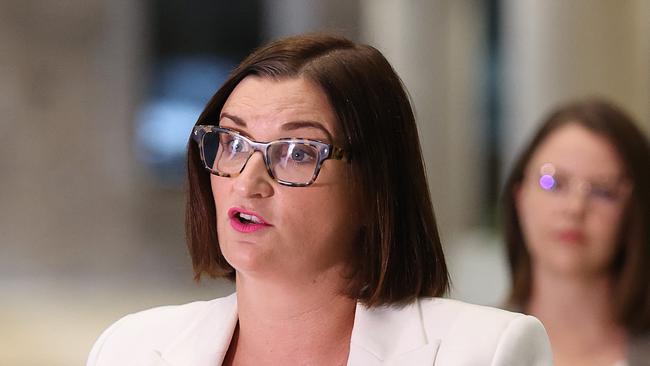NSW school curriculum shifts focus to phonics
The NSW curriculum authority has released a new draft primary school syllabus that binds teachers to ensuring children develop strong phonics skills.

The NSW curriculum authority has withdrawn support for the long-established balanced literacy approach to teaching reading, releasing a new draft primary school syllabus that binds teachers to ensuring children develop strong phonics skills.
The proposed new English curriculum for kindergarten to year 2, released on Tuesday, has dumped predictable texts as the preferred reading material for junior primary classrooms and removed all references to students relying on picture or meaning cues to “decode” new words — both of which are common in balanced literacy classrooms.
Instead, students will be required to learn the relationships between letters and sounds when learning to read, spell and write.
The proposed new syllabus also emphasises the role of decodable texts — books specifically tailored to beginning readers that typically feature only the sounds they’ve been taught — in classroom practice.
NSW began curriculum reform in 2018, with a review released last year highlighting the need to declutter some content and refocus efforts on developing pupils’ core literacy and numeracy skills. A draft junior maths syllabus has also been released.
Premier Gladys Berejiklian said the new evidence-based curriculum was more specific, leaving less room for interpretation. She said it delivered on the state government’s goals of raising standards and equipping students for jobs of the future.
“The new curriculum prioritises the basics and will ensure students develop strong foundations in maths and English,” she said.
The proposed syllabus, which was developed by the NSW Education Standards Authority with input from 45 expert teachers, represents a significant shift for many schools, where balanced literacy has been the prevailing approach for decades.
A balanced literacy approach aims to develop children’s reading skills by immersing them in literature. However, it has been found to be less effective than a structured literacy approach that teaches phonics systematically alongside other skills including phonological awareness, vocabulary, fluency and comprehension.
The move comes after Education Minister Sarah Mitchell declared an end to the reading wars, arguing that the evidence overwhelmingly supported the need to embed phonics in early classrooms. Late last year, she announced that phonics screening checks would be mandatory for year 1 public school students.
Ms Mitchell said on Tuesday that all teachers needed to follow the evidence by “teaching essential knowledge in evidence-based sequences”.
“We have prioritised essential content and provided clear examples to teachers to reduce ambiguity. Our approach is evidence-driven and focused on student outcomes. The feedback we have had from teachers so far is very positive and confirms we are moving in the right direction.”
Literacy expert Jennifer Buckingham, who advised on the draft curriculum, said the new syllabus was aligned with the science of reading and would ensure that students developed key foundational literacy skills.



To join the conversation, please log in. Don't have an account? Register
Join the conversation, you are commenting as Logout